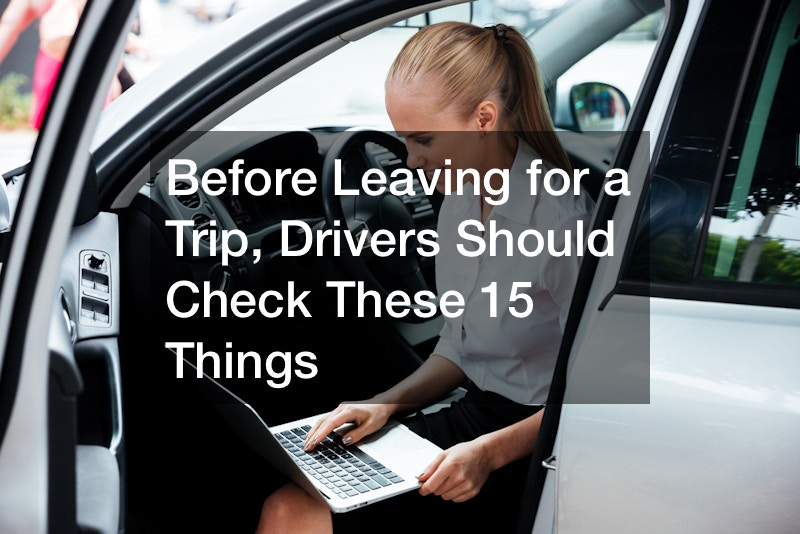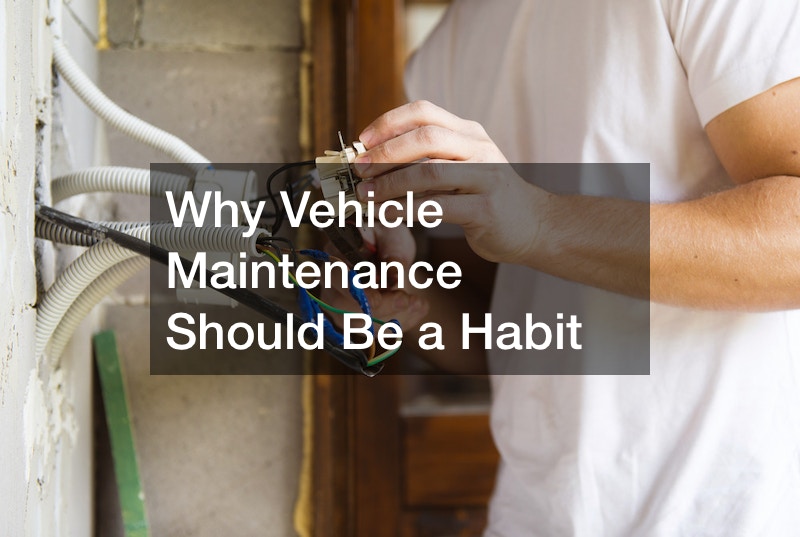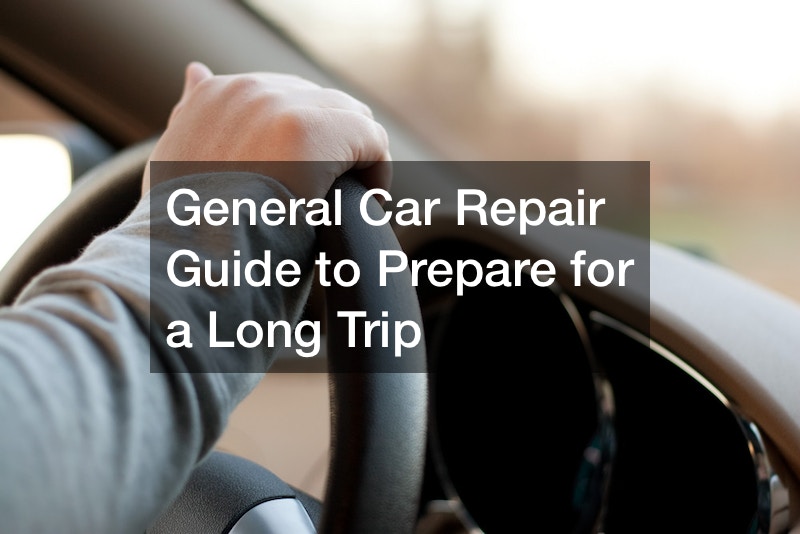Long trips on the road are often a necessity for work or family matters, and they can be a lot of fun. However, these trips can be dangerous too, especially if you didn’t plan them well before getting into your car. Whether you’re going on a business trip or hitting the road with friends for some time away from work, you need to check several things so you don’t run into trouble later on.
In this article, we’ll discuss the top 15 things you must check before going on a long road trip. You can use this list to make sure you miss nothing, and add checkpoints of your own as you need them. Note that the list is in no particular order, so no point is more important than the others—they’re all equally important.
Before leaving for a trip drivers should check that they missed none of these points, have a reliable auto accident attorney, and know an auto body shop they can trust, so they’re prepared for anything that could happen along the way. If you don’t have your own car and make use of an RV transport company to rent an RV (or hire any other kind of vehicle), you should still check these things off your list.
1. Tyre Pressure
Tyre pressure is an important item to check off your list because if your tires have improper pressure, your fuel efficiency is negatively affected. Incorrect tire pressure can also cause premature wear to your tires, which can be dangerous.
The thing is, not only can you have too little pressure, you can actually over-inflate your tires. That’s why it’s important to know the correct tire pressure for your specific tires. Fortunately, most new cars come with tire pressure monitoring systems that will alert you if there are any problems that you need to be aware of.
So, before leaving for a trip drivers should check their tire pressure and avoid any damage or accidents that can result from low tire pressure.
2. Tyre Tread Depth
Driving with worn tires is a serious risk because it can affect the handling of your car. Your braking is also negatively affected, which can pose a risk for everyone on the road around you. If you’re driving with worn tires, even the best road salt supplier won’t be able to help you keep control of your car.
As such, you need to check your tire treads before you go on any trip, whether it’s long or short. Don’t risk your life because you neglected to check your tires. You need to have tire treads of at least 1.6mm deep across the central three-quarters. If you have deeper wear, it’s time to replace your tires. Regularly visit a tire supplier you trust to check your tires.

3. Windscreen Wipers
A car’s windscreen wipers are often one of its most neglected parts because it’s only noticed when it rains and problems are typically only picked up when they stop working. Driving around with smeared or dirty windscreens is asking for trouble and can be very dangerous. Similarly, driving in the rain and having windscreen wipers that don’t work can cause an accident, so make sure you check yours before driving anywhere.
While you’re at it, you should check your windscreen as well before you hit the road. Look for any cracks or chips; if you spot any, get them fixed before driving too far. These chips or cracks can quickly become far more serious and lead to poor visibility and accidents.
4. Lights
Your lights are essential, especially if you’re driving in stormy weather or at night. Before leaving for a trip drivers should check their lights and be completely sure they work properly. When checking your lights, you need to examine your brake lights, your headlights, and your indicators.
For this, you’ll need someone else to help you since you may not be able to see any possible problems from within your car. Make sure you test the different states of your headlights (main beams and dipped beams) as well. If any of your lights aren’t working as they should, you can visit a garage for a quick fix— this shouldn’t take too long or cost too much.
5. Air Conditioning
Although air conditioning is considered by some drivers to be a luxury they should be able to do without, this is a quality-of-life element that really shouldn’t be neglected. If you’re going to drive in hot weather, you’ll be very uncomfortable in your vehicle, and this can affect your driving.
Make sure you have a nice way of cooling down by having a well-maintained air conditioning system. If it’s not working properly, your car likely needs a regassing, which is when the refrigerant gas is replaced. You should be able to sort this out in a garage or with the help of a professional— it’s not something you should try doing yourself.

6. Oil Level
Every car relies on oil for its engine to run smoothly, so before leaving for a trip drivers should check their oil levels to avoid any engine problems while on the road. If your car is running low on oil, you could end up with very costly damage or even a car that can’t drive, leaving you stranded.
You can use your car’s dipstick to check the oil level for yourself if you have an older car. Many modern cars don’t have these tools anymore. Instead, you can find the oil level indicated on the car’s dashboard by its onboard computer. Don’t ever allow your car’s oil level to drop below the minimum, which should be discussed in the car’s handbook or manual.
7. Fuel Level
Another very important element to check before leaving for a trip is the car’s fuel level. Now, this should go without saying, but many folks forget to check and then end up running out of fuel unexpectedly and far away from a gas station.
Filling up your fuel tank may take a few minutes out of your day, but it’s crucial if you want to avoid running into trouble on the road. Also, don’t forget to check your fuel level as you drive in case there’s a leak or anything that could lead to loss of fuel. Similarly, if you have a hybrid or electric car, you need to make sure it’s fully charged before you leave.
8. Engine Coolant
Your car needs engine coolant to keep it in good working order. A healthy engine can regulate the temperatures of the cooling system, preventing any overheating that can cause difficulties while you drive, as well as damage to your car. You need to check your engine coolant level so you know you’re safe as you’re on the road.
This is an important point to check for drivers of older cars as many newer vehicles have closed cooling systems that don’t need any topping up. Before leaving for a trip drivers should check the engine bay for the fluid level and if it’s below the minimum level, or close to it, it’s time for a refill.
9. Brake Fluid
Can you imagine driving your car and not knowing for certain if your brakes are working as they should? Of course not! Doing so is not only irresponsible but reckless as well. That is why, before leaving for a trip drivers should check the braking system’s fluid level to ensure there is enough brake fluid. This fluid helps your car’s brakes to work properly and should always be checked.
Just make sure that when you’re checking your car’s brake fluid level, you’re parked on a flat surface so you get an accurate reading of the level. You should also make sure the fluid is clean because if it’s dark, it’s likely to be contaminated. Contamination means poor braking performance and you should replace any brake fluid that doesn’t look up to par.

10. Driving Mode
If you’re driving a newer car, it’s likely you already have a good understanding of the different driving modes drivers get to choose from. This range of modes lets you change the settings for your engine, brakes, and suspension to meet different driving needs.
If you’re going to be on the road for a long time, it might be best to choose the ‘eco-driving mode. This mode can help you get more miles from your fuel and save money. Alternatively, you can choose the ‘comfort’ mode if you want a nice and relaxing trip and aren’t as worried about fuel costs. Be sure to check your car’s manual to learn more about its various driving modes.
11. Battery
Before leaving for a trip drivers should check their car’s battery because this is one of the most important parts of any vehicle. Neglecting to check the health of your battery can lead to serious problems along the road. Petrol and diesel car drivers should be especially vigilant because these vehicles’ batteries will degrade over time (a few years) and need to be replaced.
Signs of battery issues include a slow start or reluctance to unlock when using the key fob. You should take note of this kind of problem and check your battery even if you think it’s still in good condition. Visit a mechanic or garage to help you determine the state of your battery.
12. Emergency Supplies
If you’re going to spend a lot of time on the road and in your car, you have to be prepared for emergencies. That’s why, before leaving for a trip drivers should check their emergency supplies and ensure they’ll be okay if things go a little south while away from home.
Have numbers for car accident attorneys saved, pack extra clothes like t shirts, socks, and jackets in case the weather changes drastically, have a first aid kit stocked, and make sure you have enough water and rations for the road. You should also check the car’s antenna and make sure it works so you can pick up any emergency broadcasts if necessary.

13. Be Well-Rested
It’s just as important to ensure the health of your car as it is to ensure your own health isn’t neglected. You should rest well the night before you go on a trip so you won’t be fatigued and risk causing an accident. If you feel a bit drowsy or tired along the way, don’t hesitate to pull over and rest until you’re feeling better. Falling asleep at the wheel can happen in an instant and it only takes a fraction of a moment to put your life, and the lives of others, at serious risk.
14. Keep Your Energy Levels High
Road trips can be a lot less entertaining and more frustrating if you’re hungry and upset. It can even become difficult to focus on the road if you don’t have any fuel in your time. For this reason, before leaving for a trip drivers should check that they have enough food for the road and drive along a route that allows for shopping if necessary. Make sure you take breaks along the way so you can be rested and well-fed.
15. Charge Up
Another important thing to take care of before you leave is your phone. If you’re going to have to access GPS maps and contact anyone while traveling, you’ll need to ensure you’ve fully charged your phone. Also, make sure you have a charger you can use in the car while you’re on the road in case your battery drains. You don’t want to be without a phone in an emergency like when you need to call an ambulance or truck rental services, do you?
Safely Enjoy Your Trip
Before leaving for a trip drivers should check every element that was discussed in this article. It’s a good idea to make a copy of this list and add your own notes so you take care of everything and don’t have to worry and fuss about heavy equipment repairs later. If you’re driving safely, you’ll also never have to look for ‘cash for cars‘ deals because your car broke down!



